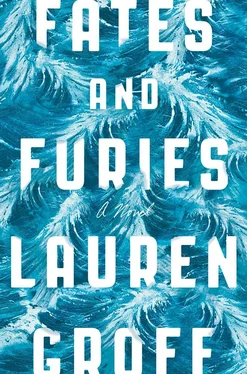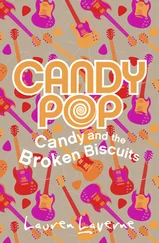“What in the fuck is happening?” he said to the darkening house. The first time in his life he’d ever uttered a swear; he’d earned the word, he felt. The house did not answer him.
—
HE STOOD BEFORE HIS MOTHER’S DOOR, brandishing a flashlight. No telling what he would find. Sallie and Rachel had spoken of hoarding. Late-night binges, Antoinette buying everything that flashed up on the shopping network. Lotto’s old room stuffed with foot spas still in their boxes, watches with interchangeable straps. “Open the door to your old room, you die in an American-style consumerist avalanche,” Rachel had said. The little money Antoinette allowed herself wasted on junk.
“Do you want us to clean out the house?” he’d asked on the phone the morning his mother had died. They’d hung in there past the sobbing and the story: Sallie getting up for water in the night to find huge Antoinette felled in the middle of the floor.
“Naw. Leave it be. House’ll burn down eventually,” Aunt Sallie had said darkly. She had announced her intention to travel the world. Her brother had left her money. She had no reason to stay put.
“At least Muvva was allergic to animals,” Lotto said. “There could’ve been cats. Eye-watering cat stink all the way down to the beach.”
“Cats smushed flat by falling boxes,” Sallie said.
“Ha! Herbarium of flat cats. A bouquet. Mount them in a frame, put them on a wall. Memento meowi,” he said.
He took a breath and opened his mother’s door.
It was neat. Floral coverlet, some kind of leak from the water bed hooping the floor in brown. Above the headboard hung a green-hued Jesus on the cross. Oh, her sad life. Oh, his poor mother. Like something out of Beckett. A woman growing like a goldfish to the size of her bowl, the only escape the final leap.
A cold hand passed through Lotto’s chest. Rising through the nightstand, half of his mother’s head: one eye huge behind glasses, one cheek, a half mouth.
He shrieked and threw the flashlight, and the light swirled twice, and there was a clatter of broken glass, and the beam came to rest crosswise on the bed, shining in Lotto’s eyes. He found a journal with a white cover. Pennies scattered. His mother’s glasses. A glass cup. They all must have been placed in such a way to make for an optical illusion. But it had been so clear, so purely Antoinette, unmistakable, even one-eyed. He shivered, ransacked her drawers for money to get himself home [only empty pill bottles, hundreds], escaped to the kitchen again.
—
HE STOOD IN THE WINDOW. He was unable to move.
Something rustled through the room at his back. It came, swift and sure. He held still. He felt a face press itself up against his nape. The face breathed coldly. In the coil of time, it remained there for decades. At last, the face withdrew.
“Who’s there?” he called out, to nothing.
He wrestled open the glass door, and the house filled with a whipping cold wind. Sound revived. He came out onto the balcony and leaned up against the rail and put his head into the rush of air. When he looked up, he understood why the world had seemed so off.
The sky was all a strange boil, purplish black. Costume designers would stab their competitors to get their mitts on such a hue. Wearing it, one would walk onstage already great with authority, Lear or Othello before a syllable was spoken.
It was the sea, though, that was most wrong.
It was frozen. The waves were cresting so slowly that it was hard to see when they broke.
This Florida was not Florida. More strange than true.
He thought, he was pretty sure by now, that this was a nightmare and he couldn’t wake up.
How swift, the slippage from keeping it together to losing it. He found himself midstride on the boardwalk, barefoot, terror swooping at his shoulders. Down into the dark, through the tiny frogs hovering inches from the ground midhop, above the dunes ragged with vines and palmetto and snake holes. The slide of sand on his feet settled him. He fell into a walk, stopped. He breathed in. As if he’d conjured it, there the moon was, glowering. Fickle, inconstant, that monthly changes in her circle orb.
The banks of condominiums and huge houses that should have been alight were not. He looked closer. No, they were gone, as if swept from shore by a huge hand.
“Help!” he shouted into the blasting wind.
“Mathilde!” he shouted.
The Mathilde he called for was the one from the first days of love, the last of college, the first sexless week in her bed on Hooker Avenue above the antique shop. Rasp of unshaved legs, cold feet, coppery taste to her skin. In daylight, she walked in her slips of clothing and left men staring like beasts in her wake. Her loneliness an island he’d shipwrecked on. The second night Lotto slept in her bed, he woke to find a room that was elongated in places, contracted in others, odd bursts of shimmering gray light on the walls, a stranger beside him. Dread poured into him. A handful of times over the years to come, he would awaken to a bedroom that was his but profoundly not, a woman sleeping beside him about whom he knew nothing. That first night of terror, he rose and went for a run as if the dread were chasing him, at dawn trotting back to Mathilde’s apartment above the antique shop with hot coffee in his hands, rousing her with the steam. Only when she smiled at him was he finally able to relax. Mathilde was there in the dawn, this perfect girl as if made to his specifications. [A different life, had Lotto listened to the terror: no glory, no plays; peace, ease, and money. No glamour; children. Which life was better? Not for us to say.]
—
HE HAD BEEN SITTING on a dune for ages. So cold the wind. So strange the sea. Far out, there were icebergs of garbage the size of Texas. Spin of bottles and flip-flops and zip ties and packing peanuts and boas and baby-doll heads and false eyelashes and inflatable taxidermy and bicycle tires and keys and mud flaps and remaindered books and insulin syringes and doggie bags and backpacks and antibiotic bottles and wigs and fishing line and police tape and dead fish and dead turtles and dead dolphins and dead seabirds and dead whales and dead polar bears and a whole teeming knot of death.
Shell-torn feet. He lost his pajama top. He wore only underwear against the elements.
He’d give his fortune to appease what angry god had brought him here. [Joke! Money’s for fools.] Then he’d give the work, he thought. The fame. The plays, well, not The Sirens . Yes, even this latest, newest, and favorite, a story of women’s buried selves, his best yet, he could sense it. Even The Sirens . Take the plays and he’d live a humble life, an ordinary one. Take it all but let him come home to Mathilde.
Light sparked at the edge of his eyesight, which usually augured migraines. The sparks came near, resolved themselves into sunlight, into the kumquat tree in the backyard in Hamlin. Sun slanted through the Spanish moss; at the edge of the lawn, a thicket of Virginia creeper, and under the thicket, the house of his ancestors returning to the Florida dirt, menaced by termites’ million chewing mouths or the great gob of a hurricane. In the shadows of the vines, the last windows gleamed.
Behind Lotto was the plantation house that his father had built, that his mother had sold one year and a day after Gawain died, moving them all to the sad little beach house. In this confused childhood world, his father stood on the other side of the pool. He was looking at Lotto tenderly.
“Dad,” Lotto whispered.
“Son,” Gawain said. Oh, his father’s love. The gentlest Lotto had known.
“Help,” Lotto said.
“Caint,” Gawain said. “Sorry, son. Maybe your mama can. She was the clever one.”
Читать дальше












